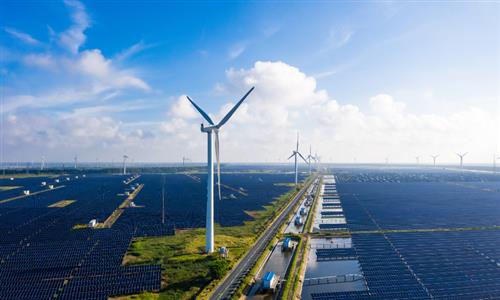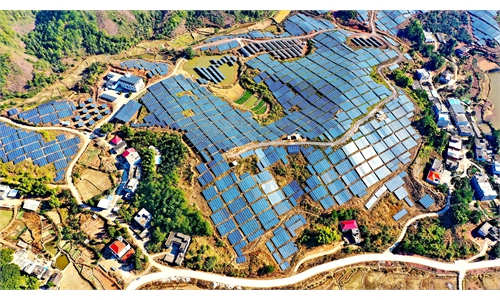
Illustration: Chen Xia/GT
China has made strides in exploring and using renewable energy sources amid efforts to cut carbon emissions. The country's electricity consumption serves as a good example of this trend. Unprecedented load in July was met by record output from hydro and solar facilities, ensuring coal-fired generation fell slightly year-on-year, Reuters reported on Tuesday.This summer, heatwaves and increased air conditioning usage are driving record-breaking levels of electricity production. Total generation rose to a record 883 billion kilowatt-hours in July, Reuters reported. However, thermal generation, which is mostly from coal, declined compared with July 2023, despite record electricity demand, according to the report.
Electricity use and shortages have become global issues, as climate changes lead to more frequent and intense extreme weather events worldwide. This, along with other factors, has elevated electricity security and affordability to the top of the economic agenda.
Global electricity demand is projected to increase at a faster rate over the next decade. The ability to meet this demand is closely tied to socioeconomic development, including a country's economic competitiveness. For instance, artificial intelligence (AI) is an electricity hog. As more companies incorporate AI into their operations beyond just large language models, we can anticipate a rise in electricity usage among many firms.
From this perspective, the world may need an electricity revolution. One direction of that revolution should be focused on renewable power generation.
Many countries have set net-zero emissions targets, committing to help prevent the harmful impacts of climate change. This means that fossil-powered generation faces limited growth potential.
The development of the new-energy industry is, to some extent, the gateway to the next wave of the electricity revolution. There is great global demand for renewable energy generation. To embrace the next wave of the electricity revolution, developing countries, in particular, urgently need to accelerate the development of new-energy industries. Their demand for foreign investment in this area is virtually unlimited.
Electricity is a fundamental input for economic activity. We are likely on the brink of an electricity revolution that will fundamentally alter the way we work. In this process, we hope the world remains vigilant to avoid falling into the trap set by some trade protectionists, who aim to label new-energy-related exports as "overcapacity."
China has some key advantages in new-energy products. The competitiveness of its new-energy sector comes from continuous innovation and investment amid fierce market competition. As China progresses in its green transformation, the share of renewable energy installations continues to rise, surpassing 50 percent of total power generation capacity as of December 2023, according to media reports.
With the continuous expansion of China's new-energy foreign trade, China is providing affordable, high-quality green products to more countries, offering technological assistance for global energy efficiency improvement, and contributing to the stability of the global green industry chain.
China has engaged in cooperation with more than 100 countries and regions on green energy projects. It is contributing to the elimination of energy poverty and the realization of the global development goal of "ensuring universal access to affordable electricity by 2030" set by the UN.
Moreover, China has been continuously promoting technological innovation in new energy, leading the development and application of core technologies that promote the global green transition. China is promoting further cost reductions in wind and solar power generation, creating more opportunities for the rapid deployment of renewable energy facilities in developing countries.
Promoting the rapid development of the new-energy industry and improving the accessibility of affordable and sustainable new-energy products globally should be a common goal and the responsibility of all countries.
There is no oversupply of green products globally, but rather a shortage. While trade protectionism and politicizing economic and trade issues will only hinder the green transition, fair competition and division of labor cooperation are steps in the right direction.
The author is a reporter with the Global Times. bizopinion@globaltimes.com.cn



